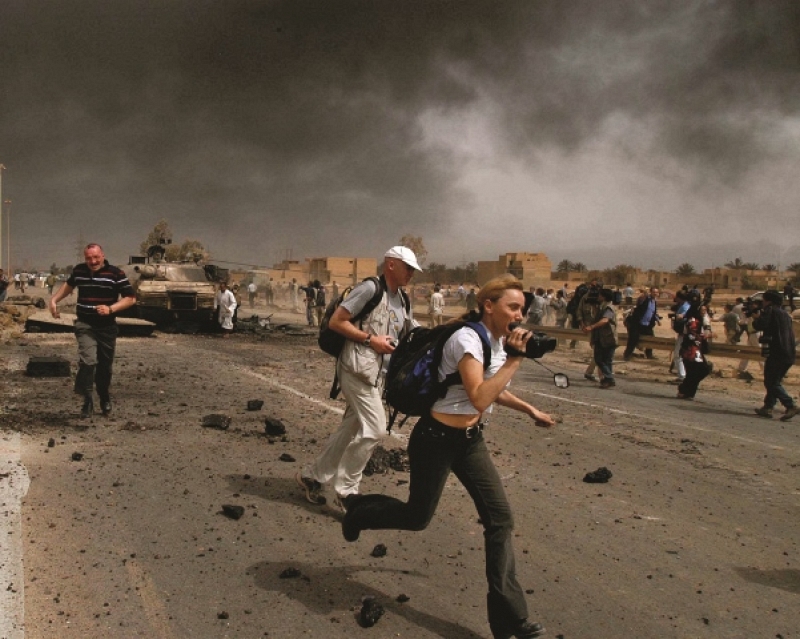WAR is a money machine
an interview with the brave journalist Elena Yoncheva and her cameraman Nikolay Ganev on some of the most violent war hotspots on the planet
Journalist Elena Yontcheva and cameraman Nikolay Nikolov have been to countless hot spots. Their last stop was Syria, where they spent 16 days in Aleppo - one of the most turbulent cities. While in Syria, the journalists reached the most radical rebel groups. They report on the events from the front line itself, they go through the deserted districts of Aleppo, where fighters have dug secret tunnels.
The two went around Israel and Palestine for 20 days and shot some of the most tragic moments of the newest history of the two nations. They documented the lives of the Palestinians and the Israelis during the Israeli military operation Cast lead. During this 22-day-long war, hundreds of civilians were killed, while thousands were left homeless.
In Somalia, Elena and Nikolay sneaked into the lair of the Somali pirates showing a day in the life of people, living in some of the most dangerous regions in the world, where weapons are the only Law. We seized the opportunity to ask them about war as an event, as a state, as history and about the war raging on inside of us.
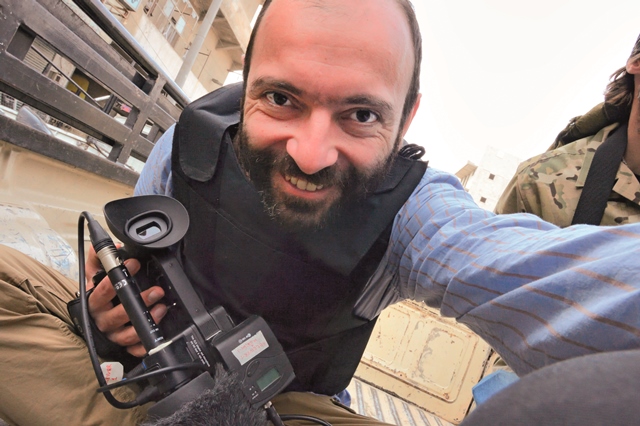
Nikolay Ganev: A meeting with death. It is an earth-shattering experience; it is a process of deep realization. A few times I was suddenly fully aware of the fact that in a matter of seconds I might not be alive anymore… Right from my first encounter with death, I knew deep within me that it was nothing more than a door. I had the feeling that any second, a saint holding the Book of Life in his hands would meet me and say: 'Now let us see what you have done and what you have not'. In such moments, you realize that in your daily life, you waste a colossal amount of energy on meaningless things, efforts wasted in vain. Once you realize that, you gain freedom- the freedom not to cling to your daily life, but to let go and just live it. You are still active, but you are no longer a slave to meaningless dramas, you are in control of your life and not the opposite. In any war, one of the parties is inevitably fighting for freedom. Personally, war gave me freedom- freedom to choose the way I look at the world and the way I live.
GS: When was the last time you felt you would not make it?
Elena Yoncheva: Now, in Aleppo. Here is the story- we were together with the rebels. "Al Qaida" were passing by us while we were taking some photos of other things and we accidentally took a photo of them as well. It was not on purpose, but they were furious; they stopped our car and there was a melee. I raised my hands in order to show I was surrendering. I really thought we would not make it that time. Even the person, who was translating, ran away. After that, he told me he had been sure they were going to shoot us. Both sides were armed and came down on each other.
GS: Did they shoot?
EY: No, no shooting took place. But there was a lot of shouting, a fight broke out. The whole time Nicky was yelling "I'm deleting, I'm deleting, I'm deleting".
NG: I called a boy from the other group, a boy that was neither yelling nor shouting. It seemed that he could be reasoned with. I called him to see me deleting that image.
"Here, see? I'm deleting it." And he came and saw the image being deleted.
EY: It was the kind of situation, when all you can think of is how many seconds of life you have left. One of the Al Qaida members was standing 10 meters away from us, holding a gun. And he was turning it to me, taking me on gunpoint and he was yelling at me with a glazed stare. At such a moment you are not afraid, you are just trying to pull yourself together. Time is moving painfully slowly, as if in slow motion. If it had not been for Niki, who kept his head… If you betray even a speck of guilt in such a situation, if you try to run away, to save yourself, you are done for.
NG: Yes, keep blaming the cameraman. (Laughing)
EY: He was to blame. I told him not to take photos of Al Qaida; I had told him so a million times. They can only be photographed at night, in secret, as we had been doing.
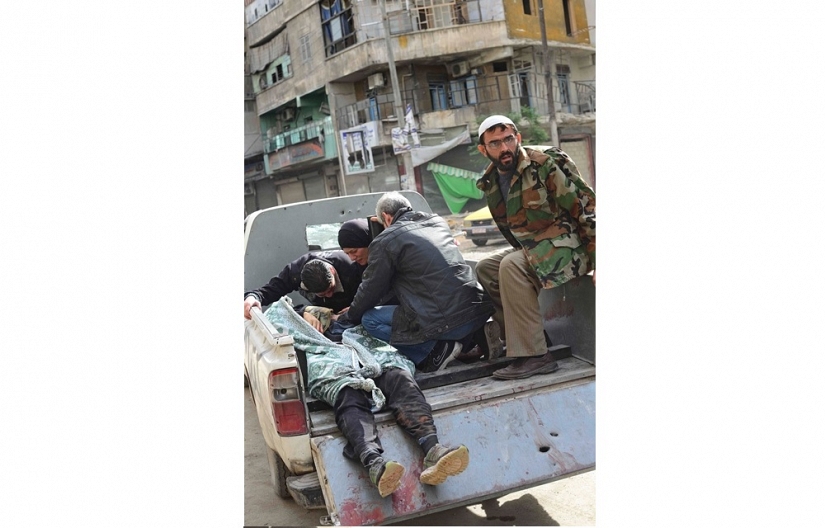
GS: Have you been in such a situation at other times?
EY: Yes, it has happened before. Some last for days, others- for seconds. This is a part of the job. But you do not constantly work under such threat. We do not go with the feeling of being doomed. At such places, journalists should carefully consider the risk and it should be worth it. We are not kamikazes. We are not adventurers, but journalists.
NG: Unlike the other hot spots, there was no safe haven in Aleppo- neither a safe place, nor a safe time. You cannot be 99% sure that nothing would happen, that no bomb would fall that very moment or that nobody would shoot. The roar of guns was everywhere; a building just a block away was shaking… So, the first night was very tense. After that, you just lie down and fall asleep. You accept reality as it is. You just accept it.
EY: The lack of information is the worst. Why? Where? What is happening? We were at great risk of being attacked, because we were in some kind of a dormitory, in the same building as rebels, with Al Qaida just two meters away from us. There were captives in the basement, as well as a few journalists, us included, and here and there-civilians. When a plane was getting closer, we moved not exactly to a bomb shelter, but to a room, made entirely of concrete. Meanwhile, Al Qaida members were going out into the yard, with their arms raised to the heavens, screaming for joy because if they got shot, they would go to heaven. When you see this, you shudder but not with fear, but at the thought of this fanaticism. They go out and scream in trance!
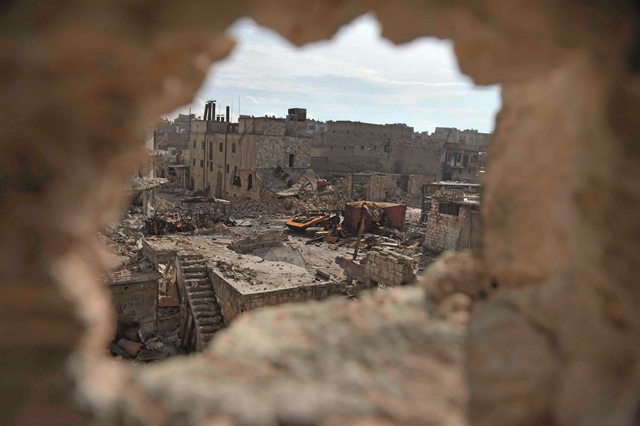
The front line
GS: Maybe they somehow make them get into a trance?
EY: Do you know where the word assassin comes from? It comes from the name of the sect of the hashishins in Lebanon, Syria. The hashishins were very active and they were used as mercenaries. And they were prepared by giving them hashish. This has been historically proven. Hashishins got into a trance and were told that there was nothing to fear about dying, because it was that ecstatic state they received from the hashish that awaited them in heaven, together with 40 virgins.
GS: But why does Al Qaida not let journalists in?
EY: I had a very tense conversation with a member of theirs in Syria. I asked the same thing - why do you not tell the world what you are fighting for? And he said: "All journalists are spies, people of the CIA. Secondly, the journalists we do let in, never present us in a positive light. That is why there is no point." These guys are not famous for their communication skills. They do not want to talk to women, and they refuse to even look you in the eyes. The only thing they say to you is "Go away!" And they say it without looking you in the eyes. They shout and wave their hands.
NG: In the eyes of the woman there is temptation. It is a sin.
EY: All of this is distortion of religion - regardless of whether we are talking about Christianity or Islam. It all stems from the poor standards of education. The less educated a person is, the more vulnerable they are to such suggestions. Jihad, for example, has different interpretations. In early Islam, it meant a battle against the infidels, but a battle of words and beliefs- a battle inside of you. Gradually, as Islam developed and they became conquerors, the word jihad acquired other depths of meaning as well. It is of extreme importance what the reading of the Islam is. That is the main difference between the various branches. There are extreme jihadists, salafists, who hold on to early Islam - they follow Muhammad's way of living; there are intelligent, highly educated people who have a totally different reading of Islam.
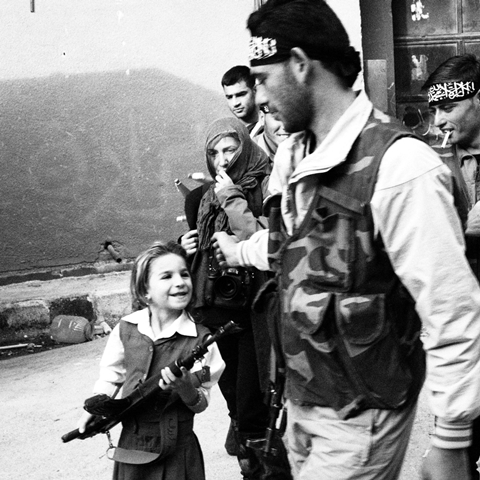
The rebels from the "Ansar Allah" squad and their leader Munzer's adopted daughter.
Photo:Nikolay Nikolov
GS: What does war smell of?
NG: In the contemporary world - of money.
EY: Like a lot of money. And it is frightening when you see it so clearly, when you realize it.
NG: It is sad to find out that ordinary people, who have gone out there to defend their homes, are actually cogs in the money machine. They are the pawns in political, regional, world or corporate games. And those poor people die, in order for someone to make a few billion more or gain political influence.
EY: This is the most painful part. These people believe that they are fighting for their freedom, for their jobs, for their homes, for their families, for a better life. It is all an illusion.
GS: Elena, what happened in the countries you have filmed in, after the wars there ended?
EY: It does not get any better anywhere. And not only that, but there is mass devastation as well… In most of the places, where the democratic forces..., although I hardly even want to use that word, because it has come to mean something entirely different, but at the places, where the ones who started the war actually won, there is widespread devastation. This is what reality shows.
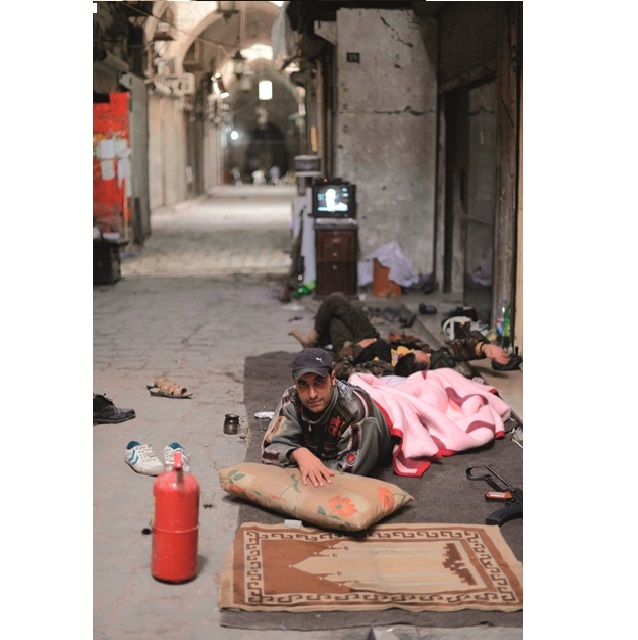
GS: What was the first thing you noticed when you landed back in Sofia?
EY: I heard birds singing. There are no urban sounds in Aleppo. That is where I understood what deathly atmosphere actually means, although there actually were people there.
NG: I felt the same, when we came back from Somalia. I felt so happy I was born in Bulgaria.
GS: How far is Bulgaria from war? Where do wars break out today?
NG: I think there is a formula, which shows where a military conflict is likely to occur. These are societies with poor standards of education, with rigid religious beliefs, which are far away from economically powerful countries able to give them protection. And they should have resources such as petrol or diamonds… This is so much the better for certain people who have huge influence and want to make even more money. In the centre of Africa, for example, no one would spend 10 billion dollars on weapons, tanks, etc.
EY: War breaks out at places, where there are resources, or at strategic locations through which the routes of those resources pass. If the society is poor, with a weak political structure, the different fractions can be easily manipulated. If there are also religious groups or different ethnicities, then mechanisms of weakening the country can be easily found. The bad thing is that recently this has been masked with platitudes about democracy. Thus the word is now devoid of meaning. In the past, the most common excuse for war was the opposition between capitalism and communism, and now they are marching us to democracy, without it actually being a democracy.
NG: It is all a huge PR.
EY: Similarly, for example, they were talking about 50 000 killed in Aleppo?! It is a tragedy even if only two people are killed, it is cynical to argue whether they are 50 000 or 10 000, but it is important, because it shows the size and how things are manipulated. All information passes through the so-called London Observatory for Human rights, which was established by "fellow Muslims" and this is common knowledge. How do they obtain this information? From some boys, sitting behind their computer screens…
I will give you an example. They called me from Sofia saying: "47 people were killed in Aleppo today. Tell the story" We were in Aleppo the whole day and it was very calm on that particular day. We had been to the hospital a few times, we would have found out if something had actually happened. We started asking around. There is nothing. And I asked Sofia - where did you get this information from? From the London Observatory, they said.
We went to some guys, who work on computers and I asked them - 'How does this London Observatory gather its information?'
"Well, they have their own people in Aleppo."
I told them: "Get me in touch me those people", with the sincere desire to tell what had been going on in the city. It turned out, it was all fake…
NG: The worst thing about it is that it turns communities one against the other. A lot of people are fighting because they have no choice, because they think that if the other force wins, it will kill all of them. And they fight to death. I do not know what water can put out such a fire.
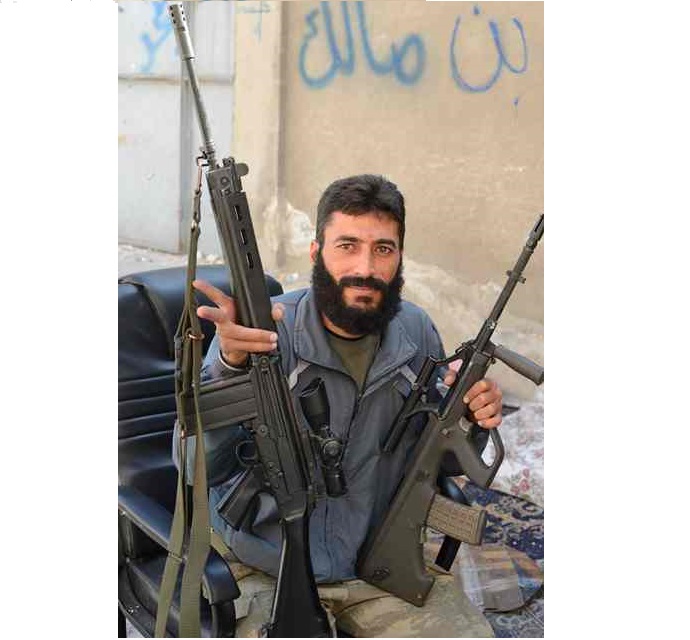
GS: Would you send any of the governors to war for a day, so they could see what it is like?
EY (Laughing): There is no one who will go.
NG: I would, but not only for a day…
EY: It is not necessary to go war to show courage and honour. You can be at the Parliament or in a cosy studio in Sofia. What does courage or risk mean? One feels the threat to themselves in differently. The fact that you could be kicked out of your job and you could end up on the street is also a threat. I do not think that going to war requires a much greater deal of courage than, for example, defending an unpopular position.
GS: Is a world without war possible?
EY: I believe so, although in life there is always some kind of confrontation, a fight between good and evil. Life is a constant fight- in a personal and social plan. War is the ugliest and most cynical expression of this fight, a fight based on greed. The question is how we solve those conflicts- with words, emotions or physical violence and destruction. If not enough effort is made, war becomes unavoidable.
NG: If everyone won the war inside themselves, no war would ever take place. There is a Buddhist sentence - "If you understand yourself, you will understand the others as well".
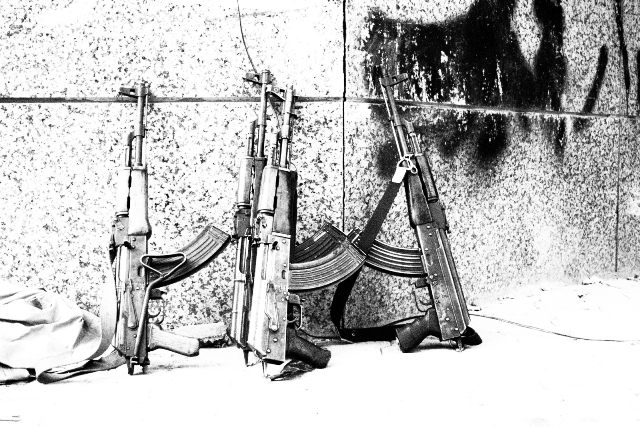
GS: What are your inner wars?
EY: They are always there. Just before I went to Syria, I had been misled by unclear information about the place, because what comes as information is very shallow, easily manipulated and one-sided. I was very worried. I was wondering whether to go at all, because sources, which I considered serious, were describing a virtual apocalypse. I believed that we could be shot at the very border.
GS: Nicky, what is your inner war?
NG: Everyone can start one. It means exploring yourself. For example, on could make a list of the positive and negative qualities they possess such as anger, hate, greed, lust… I see something bad in another person and I want to change it, but let me first search my own soul. If I notice those qualities in others, maybe I also have them? And how should I change it in such a way so that it does not influence me in situations … Gradually, a nice war is started, a war anyone can begin. But unlike the other types of war, it is beneficial not only for yourself, but also for the people around you. And in the end, there comes a time of unbelievable peace.

Nikolay Nikolov: If everyone won the war
raging inside themselves, there would be no battles.
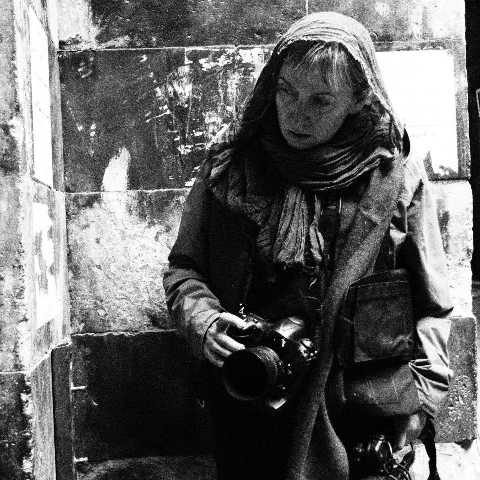
Elena Yontcheva:
After "democracy" wins, only devastation follows.
Ganeta Sagova: What is war for you, what is it like to see it with your own eyes, to feel it in your bones?
Elena Yontcheva:
After "democracy" wins, only devastation follows.
Nikolay Ganev: A meeting with death. It is an earth-shattering experience; it is a process of deep realization. A few times I was suddenly fully aware of the fact that in a matter of seconds I might not be alive anymore… Right from my first encounter with death, I knew deep within me that it was nothing more than a door. I had the feeling that any second, a saint holding the Book of Life in his hands would meet me and say: 'Now let us see what you have done and what you have not'. In such moments, you realize that in your daily life, you waste a colossal amount of energy on meaningless things, efforts wasted in vain. Once you realize that, you gain freedom- the freedom not to cling to your daily life, but to let go and just live it. You are still active, but you are no longer a slave to meaningless dramas, you are in control of your life and not the opposite. In any war, one of the parties is inevitably fighting for freedom. Personally, war gave me freedom- freedom to choose the way I look at the world and the way I live.
GS: When was the last time you felt you would not make it?
Elena Yoncheva: Now, in Aleppo. Here is the story- we were together with the rebels. "Al Qaida" were passing by us while we were taking some photos of other things and we accidentally took a photo of them as well. It was not on purpose, but they were furious; they stopped our car and there was a melee. I raised my hands in order to show I was surrendering. I really thought we would not make it that time. Even the person, who was translating, ran away. After that, he told me he had been sure they were going to shoot us. Both sides were armed and came down on each other.
GS: Did they shoot?
EY: No, no shooting took place. But there was a lot of shouting, a fight broke out. The whole time Nicky was yelling "I'm deleting, I'm deleting, I'm deleting".
NG: I called a boy from the other group, a boy that was neither yelling nor shouting. It seemed that he could be reasoned with. I called him to see me deleting that image.
"Here, see? I'm deleting it." And he came and saw the image being deleted.
EY: It was the kind of situation, when all you can think of is how many seconds of life you have left. One of the Al Qaida members was standing 10 meters away from us, holding a gun. And he was turning it to me, taking me on gunpoint and he was yelling at me with a glazed stare. At such a moment you are not afraid, you are just trying to pull yourself together. Time is moving painfully slowly, as if in slow motion. If it had not been for Niki, who kept his head… If you betray even a speck of guilt in such a situation, if you try to run away, to save yourself, you are done for.
NG: Yes, keep blaming the cameraman. (Laughing)
EY: He was to blame. I told him not to take photos of Al Qaida; I had told him so a million times. They can only be photographed at night, in secret, as we had been doing.

an injured rebel in Aleppo, photo: Elena Yoncheva
EY: Yes, it has happened before. Some last for days, others- for seconds. This is a part of the job. But you do not constantly work under such threat. We do not go with the feeling of being doomed. At such places, journalists should carefully consider the risk and it should be worth it. We are not kamikazes. We are not adventurers, but journalists.
NG: Unlike the other hot spots, there was no safe haven in Aleppo- neither a safe place, nor a safe time. You cannot be 99% sure that nothing would happen, that no bomb would fall that very moment or that nobody would shoot. The roar of guns was everywhere; a building just a block away was shaking… So, the first night was very tense. After that, you just lie down and fall asleep. You accept reality as it is. You just accept it.
EY: The lack of information is the worst. Why? Where? What is happening? We were at great risk of being attacked, because we were in some kind of a dormitory, in the same building as rebels, with Al Qaida just two meters away from us. There were captives in the basement, as well as a few journalists, us included, and here and there-civilians. When a plane was getting closer, we moved not exactly to a bomb shelter, but to a room, made entirely of concrete. Meanwhile, Al Qaida members were going out into the yard, with their arms raised to the heavens, screaming for joy because if they got shot, they would go to heaven. When you see this, you shudder but not with fear, but at the thought of this fanaticism. They go out and scream in trance!

The front line
GS: Maybe they somehow make them get into a trance?
EY: Do you know where the word assassin comes from? It comes from the name of the sect of the hashishins in Lebanon, Syria. The hashishins were very active and they were used as mercenaries. And they were prepared by giving them hashish. This has been historically proven. Hashishins got into a trance and were told that there was nothing to fear about dying, because it was that ecstatic state they received from the hashish that awaited them in heaven, together with 40 virgins.
GS: But why does Al Qaida not let journalists in?
EY: I had a very tense conversation with a member of theirs in Syria. I asked the same thing - why do you not tell the world what you are fighting for? And he said: "All journalists are spies, people of the CIA. Secondly, the journalists we do let in, never present us in a positive light. That is why there is no point." These guys are not famous for their communication skills. They do not want to talk to women, and they refuse to even look you in the eyes. The only thing they say to you is "Go away!" And they say it without looking you in the eyes. They shout and wave their hands.
NG: In the eyes of the woman there is temptation. It is a sin.
EY: All of this is distortion of religion - regardless of whether we are talking about Christianity or Islam. It all stems from the poor standards of education. The less educated a person is, the more vulnerable they are to such suggestions. Jihad, for example, has different interpretations. In early Islam, it meant a battle against the infidels, but a battle of words and beliefs- a battle inside of you. Gradually, as Islam developed and they became conquerors, the word jihad acquired other depths of meaning as well. It is of extreme importance what the reading of the Islam is. That is the main difference between the various branches. There are extreme jihadists, salafists, who hold on to early Islam - they follow Muhammad's way of living; there are intelligent, highly educated people who have a totally different reading of Islam.

The rebels from the "Ansar Allah" squad and their leader Munzer's adopted daughter.
Photo:Nikolay Nikolov
GS: What does war smell of?
NG: In the contemporary world - of money.
EY: Like a lot of money. And it is frightening when you see it so clearly, when you realize it.
NG: It is sad to find out that ordinary people, who have gone out there to defend their homes, are actually cogs in the money machine. They are the pawns in political, regional, world or corporate games. And those poor people die, in order for someone to make a few billion more or gain political influence.
EY: This is the most painful part. These people believe that they are fighting for their freedom, for their jobs, for their homes, for their families, for a better life. It is all an illusion.
GS: Elena, what happened in the countries you have filmed in, after the wars there ended?
EY: It does not get any better anywhere. And not only that, but there is mass devastation as well… In most of the places, where the democratic forces..., although I hardly even want to use that word, because it has come to mean something entirely different, but at the places, where the ones who started the war actually won, there is widespread devastation. This is what reality shows.

GS: What was the first thing you noticed when you landed back in Sofia?
EY: I heard birds singing. There are no urban sounds in Aleppo. That is where I understood what deathly atmosphere actually means, although there actually were people there.
NG: I felt the same, when we came back from Somalia. I felt so happy I was born in Bulgaria.
GS: How far is Bulgaria from war? Where do wars break out today?
NG: I think there is a formula, which shows where a military conflict is likely to occur. These are societies with poor standards of education, with rigid religious beliefs, which are far away from economically powerful countries able to give them protection. And they should have resources such as petrol or diamonds… This is so much the better for certain people who have huge influence and want to make even more money. In the centre of Africa, for example, no one would spend 10 billion dollars on weapons, tanks, etc.
EY: War breaks out at places, where there are resources, or at strategic locations through which the routes of those resources pass. If the society is poor, with a weak political structure, the different fractions can be easily manipulated. If there are also religious groups or different ethnicities, then mechanisms of weakening the country can be easily found. The bad thing is that recently this has been masked with platitudes about democracy. Thus the word is now devoid of meaning. In the past, the most common excuse for war was the opposition between capitalism and communism, and now they are marching us to democracy, without it actually being a democracy.
NG: It is all a huge PR.
EY: Similarly, for example, they were talking about 50 000 killed in Aleppo?! It is a tragedy even if only two people are killed, it is cynical to argue whether they are 50 000 or 10 000, but it is important, because it shows the size and how things are manipulated. All information passes through the so-called London Observatory for Human rights, which was established by "fellow Muslims" and this is common knowledge. How do they obtain this information? From some boys, sitting behind their computer screens…
I will give you an example. They called me from Sofia saying: "47 people were killed in Aleppo today. Tell the story" We were in Aleppo the whole day and it was very calm on that particular day. We had been to the hospital a few times, we would have found out if something had actually happened. We started asking around. There is nothing. And I asked Sofia - where did you get this information from? From the London Observatory, they said.
We went to some guys, who work on computers and I asked them - 'How does this London Observatory gather its information?'
"Well, they have their own people in Aleppo."
I told them: "Get me in touch me those people", with the sincere desire to tell what had been going on in the city. It turned out, it was all fake…
NG: The worst thing about it is that it turns communities one against the other. A lot of people are fighting because they have no choice, because they think that if the other force wins, it will kill all of them. And they fight to death. I do not know what water can put out such a fire.

GS: Would you send any of the governors to war for a day, so they could see what it is like?
EY (Laughing): There is no one who will go.
NG: I would, but not only for a day…
EY: It is not necessary to go war to show courage and honour. You can be at the Parliament or in a cosy studio in Sofia. What does courage or risk mean? One feels the threat to themselves in differently. The fact that you could be kicked out of your job and you could end up on the street is also a threat. I do not think that going to war requires a much greater deal of courage than, for example, defending an unpopular position.
GS: Is a world without war possible?
EY: I believe so, although in life there is always some kind of confrontation, a fight between good and evil. Life is a constant fight- in a personal and social plan. War is the ugliest and most cynical expression of this fight, a fight based on greed. The question is how we solve those conflicts- with words, emotions or physical violence and destruction. If not enough effort is made, war becomes unavoidable.
NG: If everyone won the war inside themselves, no war would ever take place. There is a Buddhist sentence - "If you understand yourself, you will understand the others as well".

GS: What are your inner wars?
EY: They are always there. Just before I went to Syria, I had been misled by unclear information about the place, because what comes as information is very shallow, easily manipulated and one-sided. I was very worried. I was wondering whether to go at all, because sources, which I considered serious, were describing a virtual apocalypse. I believed that we could be shot at the very border.
GS: Nicky, what is your inner war?
NG: Everyone can start one. It means exploring yourself. For example, on could make a list of the positive and negative qualities they possess such as anger, hate, greed, lust… I see something bad in another person and I want to change it, but let me first search my own soul. If I notice those qualities in others, maybe I also have them? And how should I change it in such a way so that it does not influence me in situations … Gradually, a nice war is started, a war anyone can begin. But unlike the other types of war, it is beneficial not only for yourself, but also for the people around you. And in the end, there comes a time of unbelievable peace.

